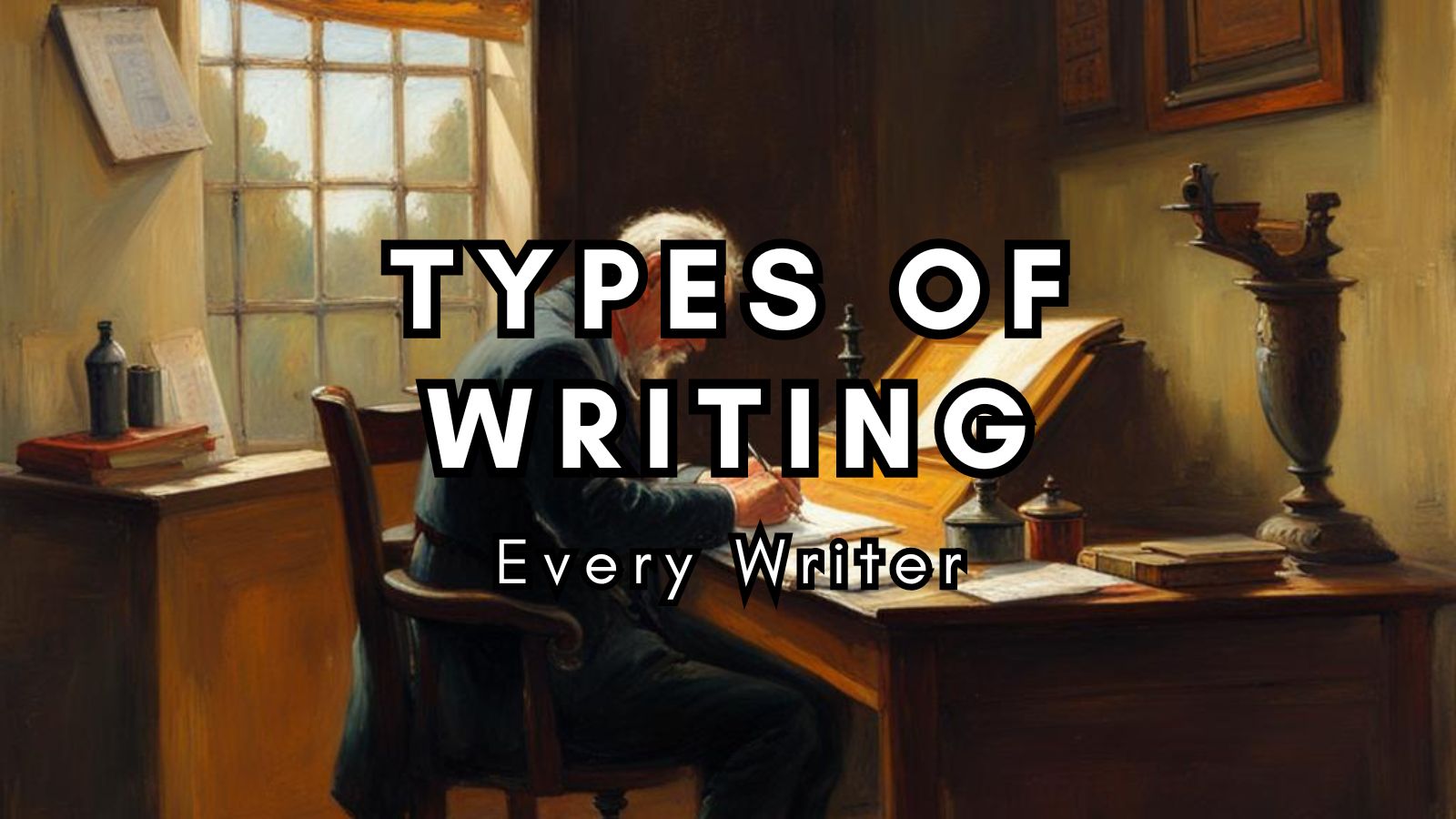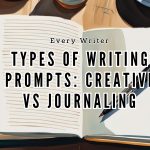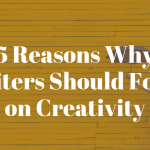Types of Writing
There are many types of writing and styles that can take to serve different purposes. Whether you want to inform, persuade, entertain or express yourself, aligning your writing style with your goals is key for effectively reaching your audience. This comprehensive guide covers over 25 major categories and examples of writing types.
From creative fiction, scripts, and humor to technical manuals, academic papers, business writing and more, discover the spectrum of writing styles you can leverage. Learn how expository, descriptive, persuasive, and professional writing each engage readers differently. See how narrative, journalism, legal writing, interviews and other genres apply specialized conventions and techniques.
Understand the unique objectives and elements that characterize satirical, scientific, marketing and interpretive writing. Expand your writing skills by considering which types best fit your objectives and message. With various formats from essays, editorials and blog posts to speeches, research reports and screenplays examined, the extensive range of writing varieties and techniques here will inspire you to broaden your writing horizons.
Writing is a means of communication that allows us to share information, tell stories, express ideas, and document events. There are many types of writing and styles that serve different purposes. Here are some of the main categories of writing. Take a look at these types of writing and see which type of writing your work falls into. These definitions of types of writing will should help inform you on what kinds of writing are out there, and what kind of writing you may want to try.
Writing Types and Styles
- Expository (essays, reports, articles, textbooks)
- Narrative (fiction, memoirs, biographies)
- Persuasive (advertising, editorials, reviews)
- Descriptive (travel, nature, character sketches)
- Technical (instruction manuals, specifications)
- Creative (fiction, poetry, humor)
- Professional (emails, business plans, linkedIn profiles)
- Academic (research papers, literary analyses)
- Journalism (news articles, features)
- Scripts (plays, movies, comedy)
- Marketing (blog posts, social media, sales letters)
- Science/Tech (lab reports, patents, academic texts)
- Business (presentations, project proposals)
- Transactional (cover letters, thank you notes)
- Interviews (profiles, Q&As, investigative)
- Interpretive (analyses, editorials, translations)
- Legal (contracts, briefs, judicial opinions)
- Satirical/Humorous (parody, essays, comics)
Expository Writing
Expository writing aims to inform, explain, or describe something to the reader. The purpose is to educate or convey information accurately. Types of expository writing include:
- Essays – Often short compositions that inform or persuade on a certain topic. Academic essays have a clear structure with an introduction, body paragraphs, and conclusion.
- Articles – Found in publications like magazines, newspapers, or online. News articles report on events or topics while other articles can explain or analyze a subject.
- Textbooks – Present factual information on academic subjects in a structured way. The writing is objective and focuses on conveying the facts.
- How-To Guides – Provide step-by-step instructions on how to do something. The writing is clear, detailed, and puts things in logical order.
- Reports – Document factual information with research and data on a specific topic. Business, scientific, and technical reports present data analysis and conclusions.
Narrative Writing
Narrative writing tells a story or recounts an event. The purpose is to engage the reader in an experience. Types of narrative writing include:
- Fiction – Novels, short stories, and plays explore imaginary people, places, and events. Creative fiction writing transports readers into a scene using detailed characters, setting, and plot.
- Memoirs – First-person narratives about past events in the writer’s life. Memoirs focus on personal experience and emotion.
- Personal Essays – Also written in first-person, these essays relate an event or share a perspective based on the writer’s experience.
- Biographies – The story of a real person’s life written by someone else in narrative form.
- Poetry – Literary writing that conveys meaning through style, rhythm, imagery, and structure rather than just plot.
Persuasive Writing
Persuasive writing aims to convince the reader of a certain point of view or to take a specific action. Types of persuasive writing include:
- Advertisements – Creative copy and imagery encourages purchase of products or services.
- Editorials – Opinion-based articles that take a position and persuade readers on current events or issues.
- Reviews – Combine opinion and information to evaluate and recommend products or experiences.
- Political Speeches – Public speaking to persuade citizens, colleagues, or opponents to support a policy, party, or candidate.
- Personal Statements – For academia or job applications, these essays convince why the writer is right for opportunity.
Descriptive Writing
Descriptive writing uses vivid sensory details to paint a picture and create an experience for the reader. Types of descriptive writing include:
- Travel Writing – Describes places and cultures the writer has visited to transport readers there.
- Nature Writing – Vividly describes landscapes, animals, and natural phenomena.
- Descriptive Poems – Use lyrical language and imagery to bring a scene or subject to life.
- Setting Descriptions – In fiction writing, detailed descriptions of setting establish place and atmosphere.
- Character Sketches – Detailed physical and personality descriptions of characters in stories.
Technical Writing
Technical writing communicates complex information to a specific audience through clear, accurate writing and visuals. Types include:
- Instruction Manuals – Provide step-by-step instructions on how to assemble or operate a device or complete a process.
- Specification Documents – Outline detailed technical specifications for engineers and manufacturers.
- User Guides – Help consumers understand how to use a software application or perform tasks.
- Legal Writing – Precise language like court briefs, patents, and legislative documents.
- Medical Writing – Clear descriptions of medical procedures, health conditions, and pharmaceuticals.
Creative Writing
Creative writing expresses ideas and thoughts in an imaginative, subjective, and artistic way. Types include:
- Fiction Writing – Novels, short stories, poetry, and creative nonfiction.
- Screenwriting – Scripts and teleplays for television, film, and theater.
- Humor Writing – Comedy that entertains through funny observations, exaggeration, and wit.
- Songwriting – Uses rhythm, melody, and rhyme to create narrative songs.
There are so many forms writing can take to engage audiences and serve different purposes. The key is aligning the writing style with your objective and intended reader.
Reflective Writing
Reflective writing analyzes experiences, events, or new information to make sense of them. Types include:
- Journals – First-person accounts of daily experiences, thoughts, and feelings.
- Reflective Essays – Draw personal insights from experiences like travel, volunteering, reading books, etc.
- Response/Reaction Papers – Respond to insights personally and analytically to express what was learned.
Professional Writing
Professional writing clearly communicates complex information between colleagues, businesses, and organizations. Types include:
- Emails/Memos – Clear, concise messages to colleagues about work activities.
- Business Plans – Detailed plans describing objectives and predicted growth of a company.
- Grant Proposals – Persuade funders or nonprofits to provide resources for projects.
- White Papers – Authoritative reports to inform readers or make recommendations.
- LinkedIn Profiles – Summarize professional background, skills, and accomplishments.
Creative Nonfiction
Creative nonfiction uses literary techniques to tell factual stories. Types include:
- Literary Journalism – Immersive, vivid stories about real events and people like Truman Capote’s In Cold Blood.
- Personal Essays – First-person stories about real-life experiences of the author.
- Memoirs – First-person nonfiction stories about the author’s life.
- Biographies – Nonfiction accounts of a real person’s life story.
Script Writing
Script writing involves writing content for performance and visual media. Types include:
- Plays – Dramas performed live on stage. Play scripts contain dialogue and stage directions.
- Movie Scripts – Visual stories for film. Movie scripts focus on action and dialogue.
- Television Scripts – Episodes for broadcast television. Teleplays structurally divide acts separated by commercial breaks.
- Speech Writing – Prepared content for speeches and presentations. Good speechwriting techniques include personal anecdotes, repetition, and clear messaging.
- Standup Comedy Scripts – Written comedic material for live performances. Comedy scripts may just outline jokes or fully script an act.
Academic Writing
Academic writing is formal writing produced in an academic setting. Types include:
- Research Papers – Reports that analyze information from academic sources on a particular topic. Research papers follow standard formatting styles like MLA or APA.
- Literary Analysis – Essays that closely examine and evaluate works of poetry, prose, or drama.
- Annotated Bibliographies – Citations of academic sources with short descriptive paragraphs summarizing each work.
- Theses and Dissertations – Extensive research papers completed to earn a graduate level degree.
- Abstracts – Brief overviews summarizing longer works of research or analysis.
Advertising and Marketing Writing
Writing designed to promote products, services, or ideas. Types include:
- Blog Posts – Entertaining or informative articles promoting a business, organization, or cause.
- Social Media Posts – Bite-sized content designed for platforms like Twitter, Facebook, and Instagram.
- Sales Letters – Persuasive letters promoting products or services to potential customers.
- Press Releases – Announcements about business achievements, products, or events to media outlets.
- Product Descriptions – Details product features and benefits for websites, catalogs, or packaging.
- Taglines and Slogans – Short, memorable phrases that capture a brand. Examples are “Just Do It” (Nike) and “Think Different” (Apple).
Technical and Scientific Writing
Writing that accurately communicates complex technical or scientific information. Types include:
- Research Articles – Reports of original research and findings in science and academia.
- Lab Reports – Documentation of experimental procedures, data, analysis, and conclusions.
- Manuals – Instructions on how to operate technical or electronic equipment.
- Medical Documentation – Records patient health information for medical, regulatory, or insurance purposes.
- Patent Applications – Legal documents describing processes or inventions seeking patent protection.
- Academic Textbooks – Books presenting authoritative research and information on scholarly subjects.
Business Writing
Writing for the workplace and business communication. Types include:
- Emails – Quick, professional communication for collaborating, sharing information, and making requests.
- Meeting Minutes & Notes – Documents discussions, decisions, and action items from business meetings.
- Policy & Procedure Documents – Clearly outline company protocols and operations.
- Presentations – Slide decks that inform or persuade coworkers or stakeholders.
- Project Proposals – Formal proposals to management recommending new initiatives or workflows.
- Case Studies – In-depth analysis of a business situation used for research or education.
Transactional Writing
Writing with the aim of communicating straightforward information or requests. Types include:
- Cover Letters – Introduce qualifications to potential employers when submitting resumes.
- Thank You Notes – Express gratitude or appreciation for gifts, time, or opportunities.
- RSVP Messages – Confirm attendance for events or decline invitations.
- Reminders – Brief notes prompting people about upcoming deadlines, tasks, appointments.
- Apology Letters – Express regret and take responsibility for mistakes or offenses.
- Congratulatory Messages – Sentiments praising accomplishments like graduations, promotions, or awards.
Interview Writing
Writing related to conducting and publishing interviews. Types include:
- Informational Interviews – Discuss a person’s career path and industry insights.
- Profile Interviews – Reveal a person’s background, personality, and experiences.
- Investigative Interviews – Seek information or accountability related to scandals, corruption, etc.
- Guest Interviews – Q&A style discussions with TV show guests about their lives and work.
- Research Interviews – Gather firsthand knowledge from experts for articles, books, or documentaries.
- Transcripts – Documents that exactly record audio or video interview content.
Interpretive Writing
Writing that explains, analyzes, or translates complex concepts. Types include:
- Literature Reviews – Survey and distill current academic knowledge on a research topic.
- Critical Analysis – Close interpretation and commentary on texts, art, or music.
- Editorials – Opinion pieces that explain events and issues to readers.
- Translation – Accurately converting texts from one language to another.
- Paraphrasing – Restating information from one source in your own words.
I’ve covered a wide variety of major writing categories and styles. Please let me
Legal Writing
Writing related to the law and legal field. Types include:
- Legislation – Documents that codify laws and regulations.
- Legal Briefs – Documents that provide a summary and arguments in a legal case.
- Contracts – Binding agreements between parties setting terms.
- Wills and Trusts – Legal documents outlining assets and inheritance wishes.
- Judicial Opinions – Written explanations of court rulings and precedents.
Satirical/Humorous Writing
Writing that critiques through humor, irony, and exaggeration. Types include:
- Parody – Imitates or exaggerates other works to be funny and critical.
- Satirical Essays – Wryly poke fun at societal behaviors and norms.
- Spoofs – Lighthearted mockery of genres like movies, ads, or books.
- Comic Strips/Cartoons – Images and captions conveying jokes and humor.
Here are the major writing types. I hope this guide helps you find something new about types of writing. We have many other articles about writing on our site. Also, if you have questions, comments or concerns please leave them in the comments below.
- 100 Screenwriting Ideas to Get You Writing - January 20, 2026
- 100 Winter Storm Writing Prompts - January 17, 2026
- 100 Haunted House Story Starters: Craft Your Scariest Tale Yet - January 10, 2026




